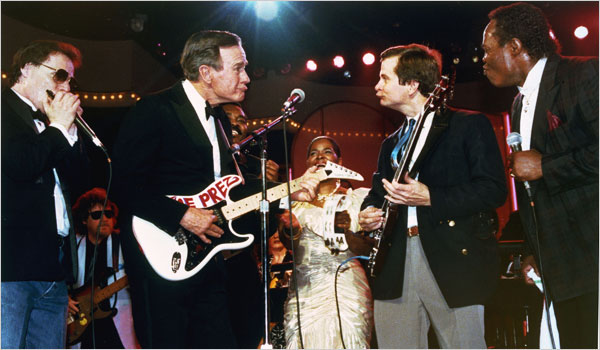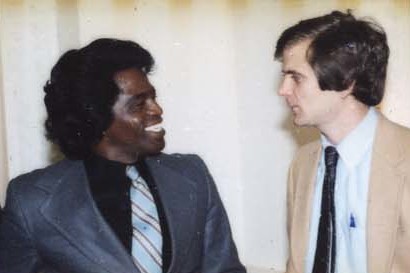We Are Multiple
The ultimate cliché: no one’s perfect. We have a culture of celebrity because our modern, literalistic religious imagination will not enable us to access the old Pagan deities, who in their particular ways were perfect. Now, we have (in Caroline Casey’s words) only the “toxic mimic” of that imagination, which once enabled us to make images that reflected our own innate possibilities. So if we want some view of those possibilities we have little choice but to raise up and celebrate an infinite procession of movie stars, pop musicians, athletes and the occasional politician to the level of demi-god.
But this involves the psychological process of projection; we almost literally project a part of ourselves onto these people (or in reality, onto images of these people). We give part of ourselves away to them, and at some point, we need to take those parts back.
When we inevitably discover that our heroes are limited, imperfect or even fraudulent (the list of male celebrities, preachers, gurus and politicians accused of sexual harassment alone is infinite), we react with the disappointed innocence of children. Or we double down, refuse to admit the obvious and defend the hill of lies we’ve created, rather than allowing ourselves to experience the pain of disillusionment. It’s complicated: should Al Franken have resigned from the Senate because of old harassment accusations? Wouldn’t an apology have been sufficient? But most of us find new celebrities to project upon. Stir, cancel culture and repeat. It’s an endless, addictive cycle because it never satisfies the need that produced it.
This kind of disillusionment has its own potential. Taking back those projections, we may well discover that they are us – and welcome them back. Not “part of us” but “us.” But it is long and difficult work:
I am not a mechanism, an assembly of various sections.
and it is not because the mechanism is working wrongly, that I am ill.
I am ill because of wounds to the soul, to the deep emotional self,
and the wounds to the soul take a long, long time, only time can help
and patience, and a certain difficult repentance
long difficult repentance, realization of life’s mistake, and the freeing oneself from the endless repetition of the mistake which mankind at large has chosen to sanctify. — D. H. Lawrence
And it may require re-assessing our modern notions of the Self.
I am not I. I am this one
walking beside me whom I do not see,
whom at times I manage to visit,
and whom at other times I forget;
the one who remains silent while I talk,
the one who forgives, sweet, when I hate,
the one who takes a walk when I am indoors,
the one who will remain standing when I die. — Juan Ramon Jimenez
Do we all contain multitudes? Or is it more accurate to say that we are composed of multitudes? For most of its existence since Freud, therapeutic Psychology has been dominated by “Ego Psychology.” Its various permutations use a theoretical and convenient construct called the ego to explain how we make rational decisions to interact with the world. The ego gives identity and is essential for mental health. The goal of psychotherapy is to strengthen and empower the ego so it can function well in society – regardless of the moral quality of that society – to, in Freud’s phrase, “love and work.”
In the 1960s James Hillman formulated Archetypal Psychology as a criticism of Ego Psychology, which includes Jung’s idea of individuation, much of what passes for “Depth Psychology,” and all notions of “self-realization.” The idea of one dominant psychic factor reflects the monotheistic tradition of the western world, with its colonial domination of traditional cultures. Other “mono-words” share the brittleness of one correct way: monopoly, monogamy, monolithic, monarchy, monotonous, monoculture.
Exclusive focus on the practical concerns of the ego fits well in particular with the radical individualism of American culture that has led to a world of constant warfare, environmental degradation, the culture of celebrity, the “Me Generation,” a historical procession of con men, narcissistic politicians, ideas that corporations are people, and a consensus valuation of the needs of the individual over the society.
In psychotherapy, this leads to what Hillman called the “therapeutic culture,” the first assumption of which is that emotional maturity entails a progressive differentiation of self from others, especially family. He argued that American psychology had come to mirror its economics: the heroic, isolated, libertarian ego in a hostile world who looks out only for himself. In our myths, he rises and succeeds entirely on his own merits:
Do you see the complete harmony between central dictatorship, fascism, political callousness, and the self-centeredness of the spiritual point of view?…Economics is our contemporary theology, regardless of how we spend Sunday.
Exclusive focus on the ego, the self (“big” self or “lesser” self), or the light, or any of the ways in which we consciously identify (white, rational, progressive, or even compassionate or peace-loving) as individual or as a national group – each of them – inevitably constellates a shadow voice, often one that would disappear into the selflessness of extreme conformism:
…the idea of surrendering to the fascist mob is the result of the separated self. It’s the old Apollonian ego, aloof and clear, panicked by the Dionysian flow.”
It is also reflects our American form of Protestant religiosity which buttresses the notion that if we fail, it is entirely our own fault, not that of social forces greater than ourselves.

Hillman offered another model, claiming that in polytheistic societies like Ancient Greece, religion reflected the understanding that the soul is inherently multiple. Only a polytheistic psychology takes this into account. Personality is a drama in which “I” participate but may not even be the main character:
I like to imagine a person’s psyche to be like a boardinghouse full of characters. The ones who show up regularly and who habitually follow the house rules may not have met other long-term residents who stay behind closed doors, or who only appear at night. An adequate theory of character must make room for character actors, for the stuntmen and animal handlers, for all the figures who play bit parts and produce unexpected acts.
So to him even the whole range of self-help books with titles such as Gods in Everyman, Goddesses in Every Woman, Awakening the Heroes Within, Healing the Inner Child, Discovering the Inner Mother, Dethroning Your Inner Critic, The Inner Self, The Giant Within, The Therapist Within, etc, though often quite valuable, still represent a “colonialism of the ego” that is entirely analogous to any centralized political power. To Hillman, that ego does not “have” images:
Images are not in the psyche as in a container but are the psyche. In other words, images mirror the psyche just as it is – as constantly imagining.
And those images inevitably demand to be recognized. For a thorough look at the theme of “the return of the repressed”, see Chapter Four of my book. As Jungian Marie-Louise Von Franz wrote, “Nothing in the human psyche is more destructive than unrealized, unconscious creative impulses.” Exactly that happened during the period we know as “the sixties”, which produced a long overdue explosion of under-valued or repressed experiences, value systems and identities (often quite justifiably angry) and led to new emphasis on diversity as opposed to the flattening effect of the old image of a “melting pot.”
In the 1980s the controversial idea of multiple or “split” personalities, or “Dissociative Identity Disorder” received much publicity (we recall that “person” and “personality” derive from “persona,” the mask in Greek Tragedy). Researchers claimed that 90% of people diagnosed with DID were victims of childhood trauma (affecting, they claim, 1.5% of the population), and that it is a response to unbearable life conditions. But their broader perspective is ego psychology; the condition is a “disorder” in which what should be a strong ego has been damaged. Hillman, by contrast, saw pathology itself as a road to the soul.
Is multiplicity a disorder, or is it something natural? Many psychological schools have emerged that acknowledged the multiple nature of the soul, as well as the idea that psychopathology does not reside in the individual, but rather in a disturbed system of family relations. These include Family Systems Theory and Parts Psychology. Ecopsychology goes even further, suggesting that much of our distress stems from our modern loss of connection with the other parts of ourselves (in the broader sense) – the natural world.
Most recently, Your Symphony of Selves: Discover and Understand More of Who We Are, by James Fadiman and Jordan Gruber, summarizes the research and celebrates our multiplicity. They go so far as to argue that
We are multitudes, and the sooner we get comfortable with this realization, the sooner we can get on with the business of forgiving ourselves – that “long difficult repentance” – and others, with all their inconsistencies and contradictions. And this offers the added possibility of welcoming and encouraging others to express the better angels of their natures.
Rumi writes:
This being human is a guest house.
Every morning a new arrival.
A joy, a depression, a meanness,
Some momentary awareness comes as an unexpected visitor.
Welcome and entertain them all!
Even if they are a crowd of sorrows,
Who violently sweep your house empty of its furniture,
Still, treat each guest honorably –
He may be clearing you out for some new delight.
The dark thought, the sham, the malice,
Meet them at the door laughing and invite them in.
Be grateful for whoever comes,
because each has been sent as a guide from beyond.
But what about those racist white Blues cats?
Part Three
The Curious Case of Lee Atwater
Perception is reality – Lee Atwater
Born in South Carolina in 1951, Atwater was one of the most complicated and influential personalities of the 20th century. He redefined the role of the reactionary political operative, enlarging upon Richard Nixon’s “Southern strategy.” His “dirty tricks,” racially charged tactics and magnification of emotional wedge issues such as abortion and crime helped Republicans win over disaffected white working-class voters to a largely pro-business agenda and away from the New Deal priorities of the Democrats. A friend of Atwater’s – a friend – observed, “Resentment became the future of the Republican Party.”
Without him, there might not have been a Ronald Reagan Presidency, and certainly no Bush (I or II), nor few of the horrors of the past thirty years: no war on terror, no war on drugs, no mass incarceration, no destruction of Welfare, no destruction of the tax laws, no mass voter suppression and no Trumpus.
Atwater was assistant campaign manager in Reagan’s 1984 re-election. That Ronald Reagan, the man about whom James Baldwin said, “What I really found unspeakable about the man was his contempt, his brutal contempt, for the poor.” By 1988 Atwater was George H.W. Bush’s campaign manager, and he created the reprehensible “Willie Horton” attack ad that portrayed Michael Dukakis as soft on crime and a friend to rapists and murderers. After the election, Atwater rose to become chairman of the Republican National Committee.
He was not only a brilliant, evil genius who faithfully served three Presidents. He was also a vicious infighter among his own peers, about whom he said, “There’s always a bunch of guys trying to outsmart you, to stick it to you. Your job is to stick it to them first.”How nasty was this bastard? Working for Reagan in 1981, he admitted:
Y’all don’t quote me on this. You start out in 1954 by saying, “Nigger, nigger, nigger”. By 1968 you can’t say “nigger”—that hurts you. Backfires. So you say stuff like forced busing, states’ rights and all that stuff. You’re getting so abstract now [that] you’re talking about cutting taxes, and all these things you’re talking about are totally economic things and a byproduct of them is [that] blacks get hurt worse than whites. And subconsciously maybe that is part of it. I’m not saying that. But I’m saying that if it is getting that abstract, and that coded, that we are doing away with the racial problem one way or the other. You follow me—because obviously sitting around saying, “We want to cut this”, is much more abstract than even the busing thing, and a hell of a lot more abstract than “Nigger, nigger”. So, any way you look at it, race is coming on the back-burner.
Atwater, despite never having run for office, was perhaps the person most responsible for shifting the country’s priorities toward a reactionary stance in which we could well ask – as I write – Did the South Win the Civil War? The man was a political thug who, in a time when America was beginning to welcome all the “Others” into the family, helped resurrect the most hateful and hurtful aspects of our national psyche. But now this story starts to get downright weird.
In 1989, still RNC chairman, Atwater was appointed to the Board of Trustees of historically black Howard University. But students rose up in protest and disrupted its 122nd anniversary celebrations, forcing him to resign. The next year, sick with a brain tumor and apparently seeking redemption, he claimed to have converted to Catholicism and very publicly apologized to several people whom his tactics had hurt, including Dukakis. In 1991, the dying Atwater wrote in Life Magazine:
My illness helped me to see that what was missing in society is what was missing in me: a little heart, a lot of brotherhood. The 1980s were about acquiring – acquiring wealth, power, prestige. I know. I acquired more wealth, power, and prestige than most. But you can acquire all you want and still feel empty…It took a deadly illness to put me eye to eye with that truth, but it is a truth that the country, caught up in its ruthless ambitions and moral decay, can learn on my dime. I don’t know who will lead us through the ’90s, but they must be made to speak to this spiritual vacuum at the heart of American society, this tumor of the soul.
An odd and heartwarming story, right? Well, it gets stranger. As a teenager Atwater played in rock bands. He was good enough to briefly play backup guitar for visiting soul singers such as Percy Sledge and Marvin Gaye. Years later, even at the height of his political power, he often played concerts, solo or – are you ready? – with B.B. King. In 1988 he and other Republican politicians opened a barbecue and music restaurant, Red Hot and Blue, in Washington.
Lee Atwater was a Blues cat.
In 1989 he produced an inaugural concert for Bush the elder, clowning onstage along with him and many Black performers. Ben Sisario writes:
Atwater’s reputation preceded him with some of the musicians he pursued, but playing for a president is a hard gig to turn down…(Koko) Taylor’s manager recalled bringing the offer to his client. “I went to Koko and said, ‘These awful people who I hate and think are a bunch of racists want you to come and perform at an inaugural ball.” And she said, ‘I want to play for a president.” As the guitarist Joe Louis Walker put it, “It’s an honor for the blues to go all the way from the outhouse to the White House, no matter who the president is.”
Recalling the event, several of the musicians said they were paid well and treated with respect. Still, there were odd moments. Willie Dixon wore a “Jesse Jackson for President” button. The music scholar Peter Guralnick wrote in an essay for the DVD of seeing musicians backstage, “…each wearing an expression of incredulity on his or her face that as much as said, What are you doing here?”
In 1990 Atwater released a Blues album featuring him playing with Carla Thomas, Isaac Hayes, Sam Moore, Chuck Jackson, and King. What the Hell is going on here? Professor and author Jelani Cobb, who was one of those students protesting at Howard University in 1989, writes:
Atwater was exemplary of a nuance in Southern politics, that people can be virulent race-baiters and still have an intimate familiarity with black and shared Southern culture, that those things are not at all contradictory.
Rock critic Dave Marsh was more direct: “Even if (Atwater was a great performer), the presence of the Republican Party chairman on the recording scene would be toxic.”
Hayes (ironically predicting the Blues Foundation’s 2021 response to Morganfield) responded,
First of all, music should be for all people…It should be free. No one should put a tag on music and say who’s to like what. If it suits your fancy, you embrace it, and that’s what that little boy from South Carolina did. I don’t see it having anything to do with party affiliation.
Hayes was being kind, with the capacity for forgiveness that perhaps only African Americans can achieve. Jackson actually insists that he and Atwater were close friends. But I’m not that kind. I’m left with the fact that Atwater deeply loved Black culture, and probably Black people, but was willing to support politicians and policies that contributed quite directly to the suffering and deaths of millions of those people.
So – We all contain multitudes, don’t we? It gets weirder still. One of the essential, even archetypally American characters residing among those multitudes is the con man, about whom I write here. If there is one thing we can say about Lee Atwater that might – weirdly – give some insight into his (and perhaps our) character, it is that almost every Republican interviewed in the ironically titled 2008 documentary Boogie Man: The Lee Atwater Story comments on the man’s sheer cynicism.
According to these people, he really didn’t believe in any of his hateful rhetoric. He probably didn’t even believe that he was a racist; only that absolutely anyone or any group could and should be used for his personal aggrandizement. One long-time friend even says that he could just as well have been a Democrat. All he cared for was proximity to power. Ed Rollins, another GOP operative and all-round horrible person, says of Atwater: “Those were the eyes of a killer.”
Remember his dying conversion and very public apologies? In the film, Rollins admits:
Atwater was telling this story about how a Living Bible was what was giving him faith and I said to Mary [Matalin], “I really, sincerely hope that he found peace”.
Matalin is another person carrying a mountain of contradictions. The lifelong reactionary operative who is married to Democratic consultant James Carville responded,
“Ed, when we were cleaning up his things afterwards, the Bible was still wrapped in the cellophane and had never been taken out of the package”, which just told you everything there was. He was spinning right to the end.
Let’s not miss the bigger picture. Are people like Atwater, Matalin and Carville too big a bunch of contradictions to wrap our minds around? Sorry, we don’t get that luxury this time around. Atwater and all the rest of the racist white Blues cats – and all the millions of us white folks who refuse to understand, let alone admit, let alone do something about our privilege – are Americans. Atwater stands in for us all. Yes, his hypocrisy was more extreme, but, as I’ve argued about Donald Trump – Trumpus – he is us. Our work is to understand this basic American story, and to work to reframe it. I conclude my book pondering about it:
Shared suffering is the great gift otherness offers us. We would realize that if we suffered together in a ritual container, democracy would invite a higher (in Christian terms, the Holy Spirit) or deeper (in pagan terms, the spirit of the land) intelligence that could resolve conflict. We would realize that an appropriate metaphor has already arisen out of this land: the spirit of Jazz improvisation. Here is Wynton Marsalis: “… to play Jazz, you’ve got to listen (to each other). The music forces you at all times to address what other people are thinking, and for you to interact with them with empathy…it gives us a glimpse into what America is going to be when it becomes itself.”
Our work is to look into our darkness, identify these multitudes, welcome them, and, as Fred LaMotte writes:
Don’t pretend that earth is not one family.
Don’t pretend we never hung from the same branch.
Don’t pretend we don’t ripen on each other’s breath.
Don’t pretend we didn’t come here to forgive.
Thanks for reading. You might like two other essays of mine on music:
Driving Dixie Down
Evolution of a Song






